“Movement and exercise are essential fundamental requirements. Children especially need plenty of exercise for the harmonious development of body and mind. Constant rhythmic alternation between the static and the dynamic, between pressure and relief of pressure, between tension and relaxation can provide the conditions for balanced physical and mental wellbeing.”
–Dr. Dieter Breithecker, Federal Institute for the Development of Posture and Exercise, Germany
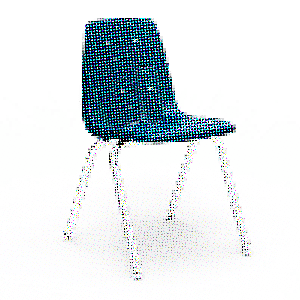 Traditional K-12 classrooms come equipped with all the same student desks and chairs. The common student chair since the 1980’s is a metal 4-legged chair with a rigid plastic back and seat that slightly slopes back putting the student in a passive inactive posture. This stacking chair is appropriately sized as a district standard at 12, 14, 16, and 18 inches from the floor to the seat, and most often purchased in dark navy blue. Many school furniture companies still make this chair in the 2020’s, but like any business they are going to continue to supply a product as long as there is a demand.
Traditional K-12 classrooms come equipped with all the same student desks and chairs. The common student chair since the 1980’s is a metal 4-legged chair with a rigid plastic back and seat that slightly slopes back putting the student in a passive inactive posture. This stacking chair is appropriately sized as a district standard at 12, 14, 16, and 18 inches from the floor to the seat, and most often purchased in dark navy blue. Many school furniture companies still make this chair in the 2020’s, but like any business they are going to continue to supply a product as long as there is a demand.
However, we at D&D Learning Spaces support new district standard seating options for students that move from static seating to dynamic seating. This transformation begins with a ‘modernist’ design from the 1920’s called the “cantilever chair.”
A Little History
The cantilever chair was first developed at the German Bauhaus Art School in the mid-1920’s by two architects, Marcel Breuer and Mart Stam.
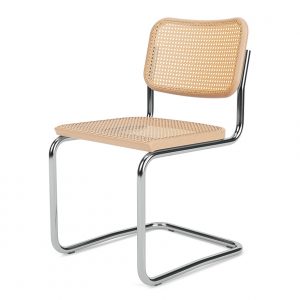 A cantilever chair is a chair whose seating and framework are not supported by the typical arrangement of 4 legs, but instead is held erect and aloft by a single leg or legs that are attached to one end of a chair’s seat and bent in an L shape, thus also serving as the chair’s supporting base.
A cantilever chair is a chair whose seating and framework are not supported by the typical arrangement of 4 legs, but instead is held erect and aloft by a single leg or legs that are attached to one end of a chair’s seat and bent in an L shape, thus also serving as the chair’s supporting base.
–Wikipedia
Marcel Breuer was the first to bend tubular steel in one continuous frame that created a subtle backward-flexing motion. In 1928, he created the cane ‘Cesca Chair’ named after his daughter Francesca and is considered a modernist classic in design and function to this day.
‘Forward-Flexing’ Cantilever Student Chairs
In this century, school furniture manufacturers started making ‘forward-flexing’ cantilever student chairs with a Z shape designed frame with a sturdy crossbar between the front legs. This new design, facilitates a student’s forward leaning motion compared to the backward rocking motion of Breuer’s original cantilever chair.
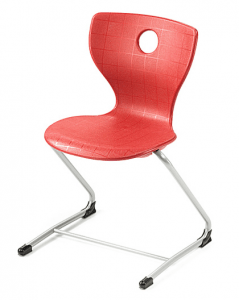 The VS PantoSwing-Lupo shown here is a fantastic alternative to the traditional 4-legged student chair as it’s stackable (5 high). The Panto shell is made of a double wall of polypropylene that creates an air-cushion effect for a comfortable sitting posture. It’s ergonomic back lumbar and forward leaning seat support, puts a student in an active learning posture, ready to think and create.
The VS PantoSwing-Lupo shown here is a fantastic alternative to the traditional 4-legged student chair as it’s stackable (5 high). The Panto shell is made of a double wall of polypropylene that creates an air-cushion effect for a comfortable sitting posture. It’s ergonomic back lumbar and forward leaning seat support, puts a student in an active learning posture, ready to think and create.
Additionally, it meets a district’s standard sizing requirements in that it begins at preschool level and moves up to adult with six different graduated sizes 12″, 13″, 15″, 17″, 18″, and 20,” a true comprehensive seating solution.
Check out this quick video to see its features, and to see the forward flexing quality of cantilever chairs in general.
In addition to the VS PantoSwing-Lupo, D&D Learning Spaces™ provides two more forward-flexing cantilever chair options for school districts.
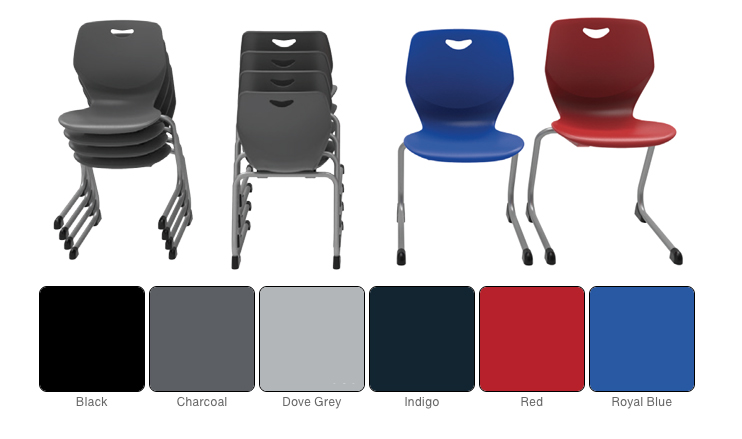
The Wisconsin Bench (WB) Sconnie Cantilever shown above is a forward-flexing chair that was added just last year to their product line. I like that it does not have the horizontal floor stabilizing bar as students have a little more open space with their feet on the floor. Currently, it comes in six standard colors with a smooth silver metal frame finish. The size options are 14, 16, and 18 inches. WB tells me that the ‘Sconnie’ shell will be expanding to other types of seating like task and cafe chairs, so look for the color options to grow as well.
 The Paragon Emoji Cantilever is a forward-flexing chair with a right angular back legs design compared to the VS PantoSwing-Lupo. It comes in 3 sizes: 14, 16, and 18 inches and is a stylish K-12 stacking seating solution for K-12 schools. Paragon also has 16 color shell options and 5 metal frame color options to choose from.
The Paragon Emoji Cantilever is a forward-flexing chair with a right angular back legs design compared to the VS PantoSwing-Lupo. It comes in 3 sizes: 14, 16, and 18 inches and is a stylish K-12 stacking seating solution for K-12 schools. Paragon also has 16 color shell options and 5 metal frame color options to choose from.
The Cantilever Chair Full Circle
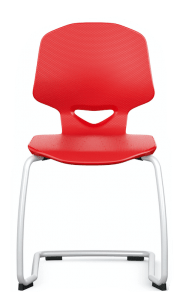 Let’s end this post at the beginning. I started with Marcel Breuer’s Cresa backward-flexing cantilever chair and I would like to now feature a 21st century version, the VS Jumper Air Meet. The Jumper Air Meet is also a backward-flexing cantilever chair designed primarily for older students and adults at 18″ inches high. This chair works great as a meeting or Wellness Center chair where gentle rocking by the participants is always a good thing.
Let’s end this post at the beginning. I started with Marcel Breuer’s Cresa backward-flexing cantilever chair and I would like to now feature a 21st century version, the VS Jumper Air Meet. The Jumper Air Meet is also a backward-flexing cantilever chair designed primarily for older students and adults at 18″ inches high. This chair works great as a meeting or Wellness Center chair where gentle rocking by the participants is always a good thing.
Like all VS Jumper® products the seat shell is made from double-walled, structured polypropylene (Air) for comfortable seating with air cushion effect. Its available in L and XL sizes. This chair is also optionally available with an upholstered seat or all-round upholstery consisting of the plastic core with a taut fabric cover.
I’m such a fan of cantilever chairs that I have a set of four backward-flexing patio chairs in my backyard. So in any activity, let’s get back to the future with forward and backward flexing cantilever chairs!
Resources
- Dr. Dieter Breithecker video – Importance of Dynamic Sitting
- Dr. Dieter Breithecker video – Dangers of Sitting
D&D Learning Spaces Cantilever Chair Links

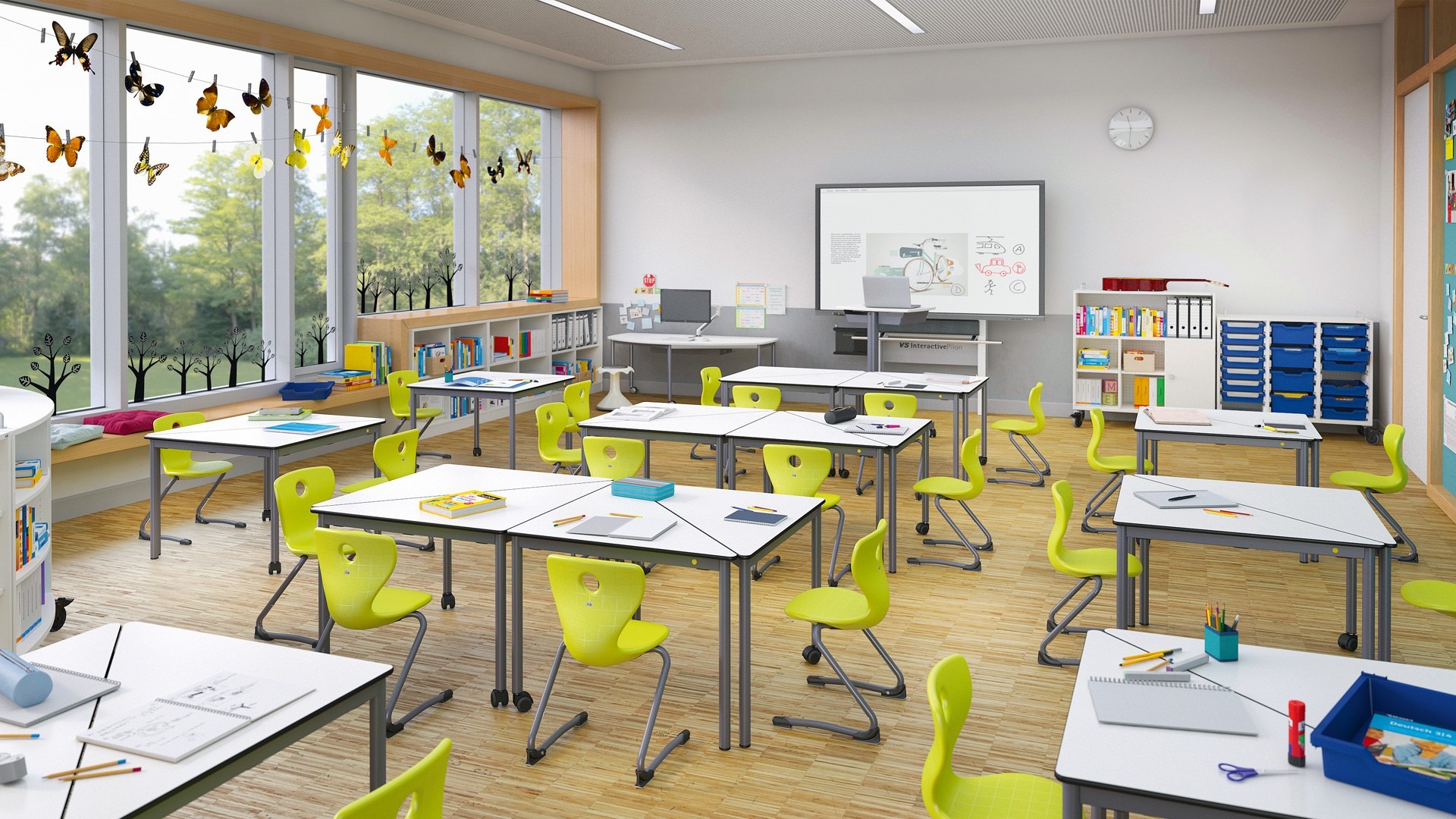
0 Comments